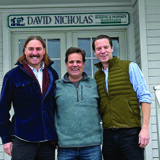Council to reconsider in the fall after Public Works files a report
CAPE MAY — The city has set a limit on how much recycling it will pick up at the curb each week, forcing residents and business owners to deal with any overflow.
City Council unanimously passed an ordinance April 15 establishing limits on residential and commercial collection. It also codified commercial collection, which had never been formally approved.
The intent is to ease the burden on the city’s Department of Public Works generated by properties that generate large amounts of recycling.
Single-family and two-family properties are now permitted 192 gallons total per week, with individual containers not exceeding one 96-gallon can. Properties of three or more units are permitted one 96-gallon can per unit, not to exceed six such cans (up to 576 gallons total) or a 2-yard dumpster per week.
While the Taxpayers Association of Cape May and other residents spoke out in opposition, Mayor Zack Mullock said City Council tried to come up with the best solution possible.
“I think every council member up here knows that with this ordinance, we’ve managed to upset both residents and businesses,” Mullock said. “Which is not our goal, but we’ve heard from both sides.”
Taxpayers Association President Peter Cole asked why the ordinance was changed in the first place. Mullock said Public Works brought the matter to the council’s attention.
“They presented a picture slideshow of, frankly, some of the mess they had to pick up,” Mullock said. “The current ordinance doesn’t have commercial pickup and [there were] questions from multiple business owners [about that], and the truth is we did not have a good answer as to why some were being picked up, and that’s the genesis to why this ordinance is being updated.”
Council asked Public Works if it could collect the amount of recycling set by ordinance within its current budget. Mullock said their answer was yes, but they do not know for sure.
“What you’ve heard from certain council members, including myself, was that I don’t support necessarily majorly increasing this budget,” Mullock said. “Perhaps if this comes back that we’re unable to pick up within that budget, then we may have to trim that back and that would be another change to the ordinance.”
Further comments from the public included questioning the recycling costs incurred by the city.
“I’m struck by the comment that the city doesn’t know how much money it costs to pick up residential and commercial recycling, and that’s spot on,” Councilman Steve Bodnar said. “We know how much the city is paying for recycling and what’s being done right now.”
A lengthy process
The process to change the ordinance began in September 2024. Councilman Shane Meier said he was proud of the work and negotiations that were done and asked the public to bear with the city as it is part of the progression.
“We took a look at ordinances at other local municipalities, and we looked at what was going on in the market in South Jersey, and what we tried to come up with was the best possible solution,” Deputy Mayor Maureen McDade said. “The primary goal in my involvement was to help the public workers. This was not to be a debate between residents and commercial, although it’s turned into one.”
She noted that at the previous City Council meeting, there was discussion about what to do with any excess.
“Well, quite frankly, if you can’t get your recycling as a business or condo association within these parameters, you are going to have to contract with someone to come pick up your recycling,” McDade said. “There are a lot of unknowns from the commercial side of this, but we didn’t want to completely abandon it.”
Council expects a report from Public Works in November about the experience with the collection change. At that time, City Council and the public will be educated on what the past several months of recycling collection have been like.
“We’ve been dealing with this for six months and we have an ordinance on the books that does not align with operational parameters that are going on each and every day in the city,” McDade said. “As a council member, I can no longer accept that.”
McDade added that passing the ordinance took longer than it should have because the city was trying to reach a compromise.
“At the end of the day, we can’t just say to the business community, ‘Good luck,’” she said. “That’s not fair to them either, and we can take the hit for that, and I’ll take the hit for that. But you can’t just say you have one can and figure it out. That’s not fair to do to a small business.”
It was critical to get the ordinance passed prior to the start of the tourism season.
“We’re coming into the summer season and think about what it would look like if we just left this without putting some parameters around it,” McDade said. “Now businesses have known that they’re going to have to probably make adjustments.”
McDade implored the public to allow council to gather the data and report back.
Several residents asked council to consider tabling the ordinance and looking at the topic further.
“Tabling it is not an option, because if we table it, we have an ordinance that we’re leaving and stranding the commercial entities in the city, and that would not be fair to them either,” McDade said.
Charity Clark of the Cape May County Chamber of Commerce spoke on behalf of city businesses.
“We are all taxpayers, and when you look at commercial, they are paying taxes on a much larger piece of land and they are paying taxes appropriate for the size of the building and lots,” Clark said. “I don’t feel like there should be a separation, and it is fair they would get all the services a residential property would get.”
Washington Street Mall Business Improvement District Co-chairman Steve Smarro said the BID saves the city a huge expense by doing its own landscaping, holiday decorating and lighting.
“We take our mall very seriously. Cape May is not just a beach town; it’s a destination town,” Smarro said. “We have it all here and you have nice shops, and that’s what makes it a complete destination. That’s what drives the property values up and keeps taxes low.”
Smarro added that helping merchants boosts the entire city.
“Cape May always wants to keep its best foot forward. We don’t need to see messes out behind buildings,” Smarro said. “So, try to take care of the recycling.”
Looking to the future
Cape May Lutheran Church Pastor Jeff Elliot said the environmental community has found that recycling is largely a fallacy.
“They put trackers on various pieces of plastic, and some end up in the middle of the ocean, some in other countries in landfills, but to say ‘recycling’ is almost zero plastic,” he said, adding the practice is costly and possibly pointless.
The mayor disagreed.
“We want to collect the most recycling we possibly can. We don’t want people to start throwing stuff in the trash to avoid recycling,” Mullock said.
– By RACHEL SHUBIN/For the Cape May Star and Wave


